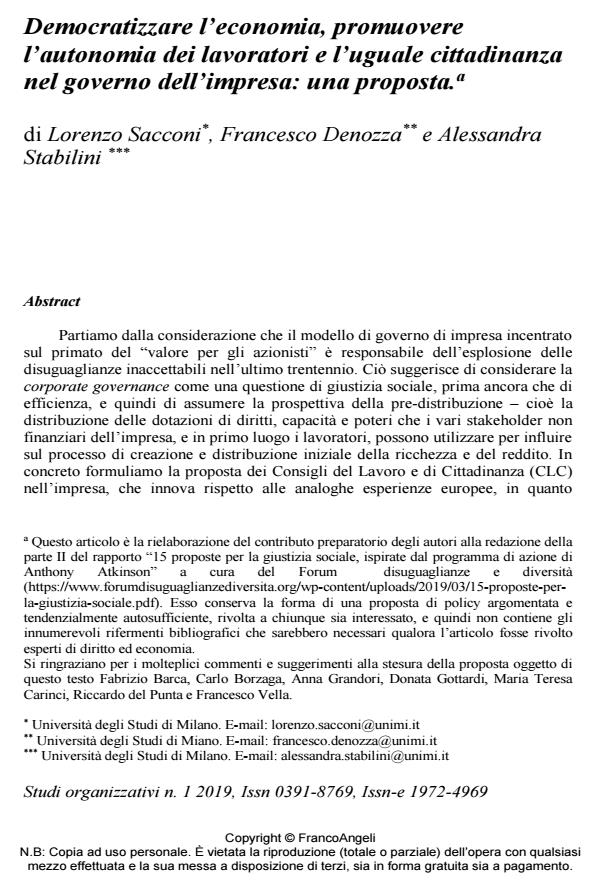Democratizing the economy, promoting employees autonomy and equal stakeholders citizenship in corporate governance: a policy proposal
Journal title STUDI ORGANIZZATIVI
Author/s Lorenzo Sacconi, Francesco Denozza, Alessandra Stabilini
Publishing Year 2019 Issue 2019/1
Language Italian Pages 30 P. 149-178 File size 528 KB
DOI 10.3280/SO2019-001006
DOI is like a bar code for intellectual property: to have more infomation
click here
Below, you can see the article first page
If you want to buy this article in PDF format, you can do it, following the instructions to buy download credits

FrancoAngeli is member of Publishers International Linking Association, Inc (PILA), a not-for-profit association which run the CrossRef service enabling links to and from online scholarly content.
The corporate governance doctrine of shareholder value primacy was one of the main determinants of the devastating increase of unacceptable inequalities in most developed countries during the last thirty years. This suggests to consider corporate governance as a matter of social justice before than efficiency. Reforms have thus to be viewed in the perspective of pre-distribution - viz. the pre-distribution of rights, capabilities, and powers that non-financial corporate stakeholders should be granted in order to influence the process of creation and initial distribution of wealth and income. In particular, the policy proposal suggested in this paper is the introduction of what we call Works and Citizenship in company Councils. It innovates with respect to similar experiences in European countries (viz. Germany and the Nederland) by including in the Council all the employees related to a given company, independently on their labor contracts, also allowing participation of workers included in the supply chain or in the business network of a main company. It moreover introduces the participation of external stakeholders like consumers and local communities affected by the company’s environmental externalities. Councils would have legal rights/powers of consultation on all the corporate strategic decisions and a co-determination power (veto power) on all the decisions of direct interest for employees. This allows them an intervention "in good time" on the formation of the corporate strategies and thus can be seen as complementary to Unions-Management negotiations at company level.
Keywords: Inequalities, pre-distribution, corporate governance, social justice, co-deteremination, worker authonomy, stakeholders, shareholder value, works council, equal citizenship.
- Democratizing Platform Work from Below Paolo Borghi, in STUDI ORGANIZZATIVI 2/2024 pp.51
DOI: 10.3280/SO2023-002003 - Organizational democracy at work. Shaping participation through strategic planning in university Carmela Barbera, Roberto Lusardi, Stefano Tomelleri, in STUDI ORGANIZZATIVI 2/2024 pp.162
DOI: 10.3280/SO2023-002007 - New trajectories in workplace cooperation: managers, employees and unions for the evolution of contemporary organizations Andrea Signoretti, Manuela Galetto, Mimmo Carrieri, Edoardo Della Torre, in STUDI ORGANIZZATIVI 1/2022 pp.7
DOI: 10.3280/SO2022-001001 - L'azionariato dei lavoratori in Luxottica: oltre il profilo individuale? Andrea Francesco Greco, in GIORNALE DI DIRITTO DEL LAVORO E DI RELAZIONI INDUSTRIALI 181/2024 pp.129
DOI: 10.3280/GDL2024-181007 - Industrial democracy between neocapitalism and postfordism. The political and intellectual trajectory of Bruno Trentin (1926-2007) Francesco S. Massimo, in STUDI ORGANIZZATIVI 2/2024 pp.27
DOI: 10.3280/SO2023-002002 - Does the Equal Opportunities Committee make democracy work (better) in academia? Laura Azzolina, Andrea Biagiotti, Carmela Guarascio, in STUDI ORGANIZZATIVI 2/2024 pp.137
DOI: 10.3280/SO2023-002006 - Still in search of organizational democracy: exploring new opportunities and constraints Luca Carollo, Lisa Dorigatti, Annalisa Murgia, Simon Parker, Thomas Steger, in STUDI ORGANIZZATIVI 2/2024 pp.7
DOI: 10.3280/SO2023-002001
Lorenzo Sacconi, Francesco Denozza, Alessandra Stabilini, Democratizzare l’economia, promuovere l’autonomia dei lavoratori e l’uguale cittadinanza nel governo dell’impresa: una proposta. in "STUDI ORGANIZZATIVI " 1/2019, pp 149-178, DOI: 10.3280/SO2019-001006